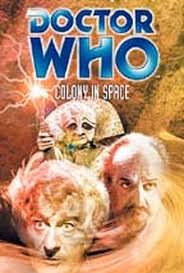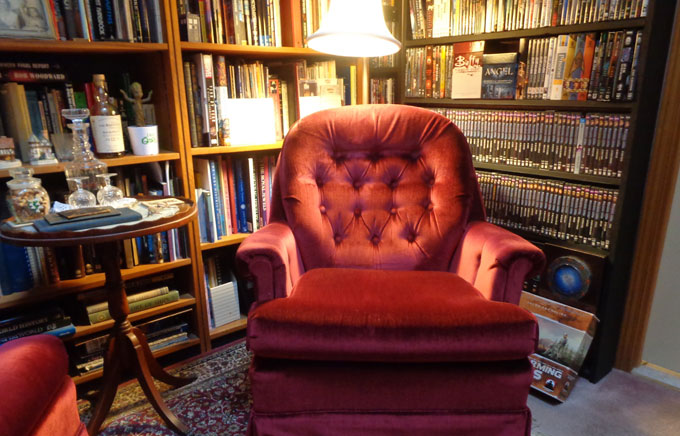
The Time Lords meet to discuss the threat of a doomsday weapon. They are forced to turn to the Doctor, who is sent, with companion Jo Grant, entering the TARDIS for the first time and discovering the theory of dimensional transcendence—bigger on the inside--to the desert world of Uxarieus in 2472. Colonists there are barely surviving, harassed by a mining corporation and huge reptiles. The Governor, Robert Ashe (John Ringham), welcomes them and explains that the colonists arrived from Earth a year ago from the overcrowded and polluted Earth. Two colonists are killed by reptiles that night. The next day a man named Norton (Roy Skelton) arrives from another colony that was all but wiped out by reptiles. The Doctor is threatened by a mining robot controlled by Caldwell (Bernard Kay), the Interplanetary Mining Corporation’s mineralogist. His boss, Captain Dent (Morris Perry), has been using it to scare the colonists and has killed some. The IMC wants them to leave the planet, so the corporation can access rare minerals without opposition.
The natives, called “primitives” have a truce with the colonists, and one of them is framed for the murder of a colonist. Norton may not be from another colony as he claims, but an agent provocateur from the mining company. Someone has also tried to kill the Doctor, and he explains to Mary Ashe (Helen Worth) that the reptiles are not responsible for the deaths—the miners are. An Adjudicator is sent from Earth to judge the territorial dispute, but it is the Master Roger Delgado), and he is on the side of the mining company.
The Doctor and Jo are in the primitive city and discover cave-paintings that indicate it has declined from an advanced civilization. They speak to a tiny alien called The Guardian (Normyn Atkyns), who warns them trespassing means death, but lets them go. The returning Doctor and Jo, not knowing that he is the Master, listen to the Adjudicator’s judgement. There can be no appeal unless there are special circumstances, like historical interest. The Master manipulates the Doctor into accompanying him to the primitive city. Tensions are worse between colonists and miners and are turning more violent. Dent wins the struggle and puts Ashe and Winton on trial. They will be executed unless the colonists agree to leave on their old ship, despite Ashe’s warnings that it is dangerous.
The Master tells the Doctor that the primitives’ advanced civilization once possessed a super-weapon, which he wants. It was so powerful that the Crab Nebula is the result of its test-firing. He wants to Rule the Galaxy with the Doctor at his side. Really? They argue before the Guardian. The Master offers the primitives the restoration of their past glory—you know: Make Uxarieus Glorious Again. The Doctor warns that the weapon is the very thing that caused them to fall from glory in the first place. The Doctor is given the honor of activating the self-destruct on the weapon. The city crumbles about them but the time-travellers escape. The colonists’ ship has exploded on take-off, just as Ashe warned, but the only one on board was the self-sacrificing Ashe. The colonists come out of hiding and defeat the miners. The Master, of course, escapes. The radiation from the stored weapon is what was killing the colonists’ crops, and now they can thrive. The Doctor and Jo leave in the TARDIS, returning to Earth again.
Script editor Terrance Dicks wanted this story to put an end to the self-limiting Earth Exile plot. The story was written by long-time Doctor Who writer Malcolm Hulke (wonderful name, and he looked like Boris Karloff), who was a registered communist and loved stories about the downtrodden defeating their capitalist exploiters—he was a big reason why the Doctor started so many revolutions over the years--but with the miners toting rifles and the primitives carrying spears, it was also a kind of Cowboys and Indians story. The shoot was difficult in the freezing, muddy Clay Pits of Hell, as the actors and stuntmen called them, but it all looked very much like a despoiled alien world. They had the use of two just-invented four-wheel-drive flatbed trucks that looked quite futuristic, though it cost a lot to put them back in good shape afterwards. The TV tapes were wiped out, but TV Ontario came to the rescue.
Part 1
Part 2
Part 3
Part 4
Part 5
Part 6
